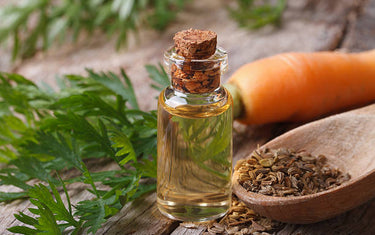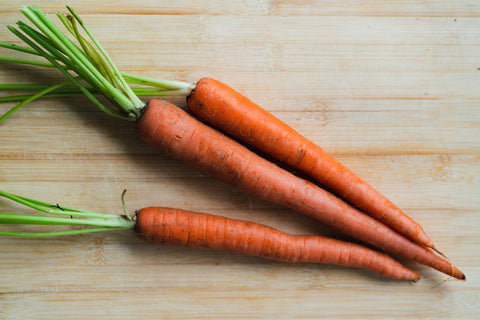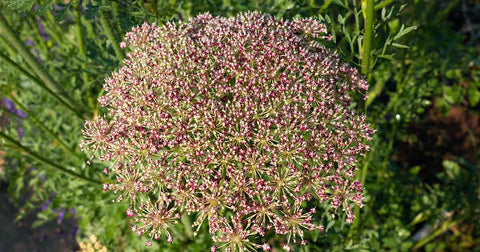9 min read / 18 December 2023 / yasmin sharp
10 Benefits and Uses of Carrot Seed Oil
Carrot seed oil is a cleansing, protective oil with great benefits for hair and skin.
Share this post

The strong, earthy scent of carrot seed essential oil can be somewhat polarising, which helps to explain why it is so often overlooked within the aromatherapy community.
However, if you can overcome the aroma, the potential health benefits contained within the seeds of the wild carrot plant have much to offer our wellbeing,
It was something well recognised by the Greeks and Romans, who would use the oil to ease indigestion and calm inflammation.
Since then, researchers have discovered it also contains antimicrobial, antifungal and antioxidant properties and here we discuss how these benefits of carrot seed oil, and more, could be put to practical use.
What is carrot seed oil?Carrot seed oil is distilled from the seeds of the wild carrot plant, which is referred to botanically as Daucus Carota. The wild carrot plant is grown worldwide and is most typically used as a root vegetable for culinary purposes. Once the seeds have been distilled, it produces a distinctive scent and an orangery-yellow oil that offers an array of health benefits. It is important to note that it is different from carrot oil – which is a carrier oil infusion and not an essential oil. Carrot seed essential oil is also not the same as cold-pressed carrot seed oil, which is used in skincare and cosmetic products. |
How does carrot seed oil work?
Depending on how it is used, carrot seed oil benefits can be applied to your body and mind using a variety of methods.
One of the most common is through aromatherapy. When diffused or inhaled, the warm, woody, herbaceous scent can have a calming, grounding effect that soothes feelings of anxiety, stress and fatigue.
Topical applications of carrot seed essential oil help to refresh and enliven skin, reduce inflammation and give protection against various forms of bacteria and fungus.
Carrot oil can also contribute medicinally, with some studies suggesting it can lower blood pressure, quicken the healing of wounds and more.

Benefits of carrot seed oil
The benefits of carrot seed essential oil means it could be used to:
1. Provide antimicrobial protection
The powerful antibacterial and antifungal properties of carrot seed oil have been demonstrated by numerous studies in recent years.
For example, a 2013 study showed the oil to be effective against E. coli, whilst also noting that it was able to combat salmonella and candida. [1]
Researchers believe that this is possible thanks to a chemical compound contained in the oil called alpha-pinene.
Many more studies have also demonstrated the benefits of carrot seed oil against a host of harmful microorganisms, which could also make it useful for homemade cleaners.
2. Work as a powerful antioxidant
Carrot seed oil benefits also include antioxidant properties, allowing it to limit and prevent damage caused by oxidation.
Free radicals are responsible for causing oxidative damage.
These are unstable atoms that can cause an unwanted chemical chain reaction in the body.
This includes the destruction of cells, which can sometimes lead to the development of serious and long-term health conditions.
The antioxidants contained in carrot seed oil possess the ability to attack these free radicals and inhibit their presence.
Researchers even showed that the antioxidant effects of the oil can provide much needed protection for the liver against damage. [2]
3. Boost skin and hair health
When applying carrot seed oil topically it should always be diluted with a carrier oil, which allows it to potentially provide a host of benefits for skin and hair.
Many people have reported that consistent use of carrot seed essential oil helps to protect hair and skin, leaving them feeling softer and looking healthier, especially when used in combination with rosemary oil, which is also stacked with beneficial properties.
Carrot seed oil’s hair and skin benefits could be made possible by its antioxidant properties, which may offer protection against environmental irritants like pollution and sunlight.
However, more research is needed to confirm how much protection the oil can provide.
4. Act as a natural sunscreen ingredient
Carrot seed oil uses could include providing protection against UV rays, with some studies suggesting that it can work as a natural sunscreen ingredient in combination with other herbs.
One study, published in 2009, stated that commercial products containing herbs such as green tea, carrot, and aloe vera could provide an SPF range between 10 — 40. [3]
However, whilst the study does allude to the testing of carrot oil, it does not specify which type of carrot seed was present in the tested sunscreen.
This does leave some questions about the veracity of the test data, so if you do wish to use carrot seed oil as a sunscreen, you should do so in combination with a commercial SPF sun protectant.
5. Fight cancer cells
Researchers are constantly looking at new substances and mixtures that could prove useful in the fight against cancer, initially putting them to the test in laboratory environments.
One such study, published in 2015, suggested that carrot seed oil contains anti-cancer properties that could be used against breast cancer, leukaemia and colon cancer cell lines. [4]
An earlier rat study from 2011 looked to investigate the effect of carrot seed oil on skin cancer.
Researchers produced promising results, finding the oil to be particularly effective. [5]
However, much more research is needed in this area before any solid conclusions can be reached about carrot seed oils anti-cancer potential.

6. Improve gut health
The presence of the alpha-pinene compound could mean that carrot seed oil could provide gastroprotective benefits.
According to this animal study, the compound demonstrated an ability to reduce the growth of gastric ulcers in mice. [6]
By inhibiting the presence of these ulcers, it reduces the chances of other digestion-related issues from forming.
The presence of carrot seed oil in the system could also help to stimulate the release of various digestive fluids, juices, enzymes and hormones that aid the metabolic and digestion processes.
7. Enhance brain functioning
When used in aromatherapy, the light, earthy scent of carrot seed oil benefits the mind to make it easier to relax and find peace and serenity.
Whether you are trying to keep on top of stress, anxiety, fatigue or physical weakness, diffusing carrot seed oil can provide a sense of comfort and aid better sleep.
Other ways to enjoy the aroma of the oil include using an oil burner, melting carrot oil-infused wax melts or candles, or adding a few diluted drops of the oil to warm bath water.
8. Improve wound healing
One of the lesser-known benefits of carrot oil is its ability to treat wounds and cuts, potentially helping them to recover and heal more quickly.
Many people believe that the anti-inflammatory and antiseptic properties of the oil can accelerate the healing process following direct application, whilst also inhibiting growth of harmful bacteria.
Scientific claims have even been made by some researchers that carrot seed oil could be used as an effective remedy to combat salmonella and staph infections. [7] [8]
9. Lower blood pressure
In addition to its ability to lower kidney protection, it may also be able to control blood pressure.
According to the results of a human study published in 2011, after participants had consumed freshly squeezed carrot juice every day for three months, researchers noted a 5% reduction in systolic blood pressure. [9]
This means that the regular consumption of freshly squeezed carrot juice could be responsible for reducing the pressure placed onto arteries when the heart rests between each beat.
10. Naturally detoxify the body
Not everyone feels comfortable using commercial detoxifying products and medicines in the form of powders and tablets, especially if they do not know the full extent of the ingredients being used.
The diuretic benefits of carrot seed oil could mean it is able to increase the frequency of bodily urination, increasing the amount of toxins and waste being released.
This process may prevent the causes and symptoms of ailments and conditions associated with a build up of toxins, which can include the likes of uric acid, bile, fat and other forms of other harmful bacteria that can affect the excretory system.

How to use carrot seed oil
You can use carrot seed oil in lots of different ways, such as applying it:
As a skincare lotion
To enjoy smoother, clearer-looking skin, including carrot seed oil in your daily routine could make all the difference.
One of the most popular uses of carrot seed oil is through topical application, which you can try by diluting a few drops with a carrier oil of choice to create an all-natural cleanser.
Alternatively, you can add a few drops to your favourite skincare products for an extra boost.
As a nail care solution
Carrot seed essential oil is rich in vitamin A, which is why so many people use it to support nail growth and provide cuticle care.
It’s a simple mixture you can create at home by mixing a few drops with a carrier oil like grapeseed, before applying it to the nail beds once a week.
History of carrot seed oil
There are large parts of the history of carrot seed oil that remain unknown, as carrots have always been recognised for their root vegetable, rather than their seed.
However, what is known about the history of the oil can be traced back to some of the earliest societies in human history.
For example, inflammation and indigestion were believed to have been treated using carrot seed oil by the Egyptians, Greeks and Romans.
Traditional Chinese medicine also incorporated use of carrot seed oil to treat muscle pain, as well as a remedy for intestinal issues like worms and dysentery.
Whilst not everyone is a fan of the oil’s distinctive scent, it has a long track record of providing health benefits for a variety of conditions and ailments, making it an essential oil that should never be overlooked.

Carrot seed oil FAQs
What are the risks of carrot seed oil?
No research has been conducted on the risks of ingesting carrot essential oil, although as most essential oils have high concentration levels, it is best to avoid consumption.
If you have an allergy to carrots, then look for an alternative oil and first-time users should ideally complete a patch test before applying the oil to large areas of skin.
What vitamins are in carrot seed essential oil?
Carrot seed essential oil contains A, C, B1, B2 and various essential fatty acids.
This makes it perfect for use on skin and hair, helping to keep it revitalised, so it looks and feels young.
Carrot seed oil can also work as an anti-inflammatory and antioxidant, which provides a host of health benefits for the body.
What oils does carrot seed essential oil blend well with?
Carrot seeds essential oil blends well with a wide range of other oils.
In terms of essential oils, this includes the likes of rose absolute, patchouli, sandalwood and geranium.
When mixing with a carrier oil, using sweet almond oil and jojoba oil often tends to bring out the best in the essential oil.
[1] Nesrine Rokbeni et al. (2013) Variation of the chemical composition and antimicrobial activity of the essential oils of natural populations of Tunisian Daucus carota L. (Apiaceae) https://pubmed.ncbi.nlm.nih.gov/24327447/
[2] Kamlesh Singh et al. (2012) In vivo antioxidant and hepatoprotective activity of methanolic extracts of Daucus carota seeds in experimental animals https://www.ncbi.nlm.nih.gov/pmc/articles/PMC3609303/
[3] Kapoor Shweta et al. (2009) Efficacy Study of Sunscreens Containing Various Herbs for Protecting Skin from UVA and UVB Sunrays https://www.researchgate.net/publication/287743863_Efficacy_Study_of_Sunscreens_Containing_Various_Herbs_for_Protecting_Skin_from_UVA_and_UVB_Sunrays
[4] Mirna Tawil et al. (2015) Wild carrot oil extract is selectively cytotoxic to human acute myeloid leukemia cells https://pubmed.ncbi.nlm.nih.gov/25684522/
[5] Rami Abu Zeinab et al. (2011) Chemopreventive effects of wild carrot oil against 7,12-dimethyl benz(a)anthracene-induced squamous cell carcinoma in mice https://pubmed.ncbi.nlm.nih.gov/21777042/
[6] Marcelo de Almeida Pinheiro et al. (2015) Gastroprotective effect of alpha-pinene and its correlation with antiulcerogenic activity of essential oils obtained from Hyptis species https://www.ncbi.nlm.nih.gov/pmc/articles/PMC4329611/
[7] Marika Pellegrini et al. (2020) Salmonella enterica Control in Stick Carrots Through Incorporation of Coriander Seeds Essential Oil in Sustainable Washing Treatments https://www.frontiersin.org/articles/10.3389/fsufs.2020.00014/full
[8] Jorge M. Alves-Silva et al. (2016) New Claims for Wild Carrot (Daucus carota subsp. carota) Essential Oil https://www.ncbi.nlm.nih.gov/pmc/articles/PMC4769755/
[9] Andrew S Potter et al. (2011) Drinking carrot juice increases total antioxidant status and decreases lipid peroxidation in adults https://pubmed.ncbi.nlm.nih.gov/21943297/










